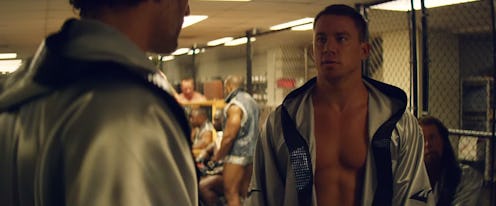Entertainment
Hollywood Is Not Suffering From "Reverse Sexism"

Here we are, once again, having to argue against the vexingly ignorant standpoint that men just can’t catch a break in today’s society. A Deadline article published on Sunday contends that male movie stars can't get acting roles in the wake of Hollywood’s affliction with “reverse sexism.” This is our Hollywood the article is talking about, by the way, in our 2015. Not some construct of a parallel dimension where any of these things might be true or, more inscrutable yet, cause for concern.
The post goes on to lament the dissipation of the male image in show business, lauding “the era of Steve McQueen, Paul Newman and the young Redford,” and asserting, “today the guys can’t even get hired.” But little more than a simple glance at the year’s feature film release schedule is needed to show just how unfounded this claim really is.
We combed through every narrative picture yet to come out in 2015 (that includes wide and limited released, plus a few expansions carrying over from films that opened in select theaters in late 2014) to glean a more accurate assessment of contemporary Hollywood’s ideas and treatment of men and women. Shockingly enough, things aren’t going quite as terribly for the fellas as this Deadline article may have made it seem.
As of July 13, America has seen the release of 125 feature films, and, of these, 78 are headlined exclusively by one or more male actors. Within that group, we find a surplus of wholly recognizable stars — the sort of Steve McQueens, Paul Newmans, and young Redfords that have no place in modern show business’ reverse sexist realm — including but not limited to George Clooney in Tomorrowland, Bradley Cooper in American Sniper, Johnny Depp in Mortdecai, and Vin Diesel in Furious 7. And that’s not to say the remaining 47 pictures are stocked solely with female leads. In fact, 22 split principal material among a male-and-female duo (a good deal of these are romantic pictures, it’s worth noting) or among a “coed” ensemble cast.
Of the remaining 25 properly female-led films, 10 involve substantial supporting roles for male actors of repute. Notable mentions include Alec Baldwin in Still Alice, Lewis Black in Inside Out, Jai Courtney in Insurgent, Alan Cumming in Strange Magic, and Theo James in Insurgent. To be fair, it isn’t only the allegedly diminishing volume of male stardom that Deadline is mourning, but the quality of the roles afforded to the dudes who are managing to scrape together gigs. According to the article, “The leading men in Magic Mike XXL and Terminator: Genisys looked like they were sleepwalking (or sleep dancing). George Clooney in Tomorrowland was formidably forgettable. And Bradley Cooper did his best to build a character in Aloha, but the script did him in.” The post goes on to pine for the days when “guys like Sean Connery, Richard Burton, or even the late Omar Shariff… were ladies men and drank, gambled and caroused.”
In the very same sentence, the post tosses skepticism at the notion that a woman (“not named Angelina Jolie”) could successfully headline a superhero picture, essentially having its cake and eating it too: admonishing the industry for giving women all the good roles, yet claiming that no actress has or can effectively handle the most valuable blockbuster genre we know today.
As the data proves, men still have the stronghold on the big screen. Of the 125 feature films released so far in 2015, only 25 are led properly by a female performer. What’s more, only 15 of those don’t include a substantial supporting role for a major actor. We have seen progress in the opportunities afforded to women — this year alone, we’ve seen comedies like Spy and action-thrillers like Mad Max: Fury Road, as well as the genre-transcendent for-women masterpiece Magic Mike XXL — but the ratio has hardly tipped in the female population’s favor. And, if and when it does, that’ll hardly be something to fear.
Images: Warner Bros (2); United Artists; Summit Entertainment/Lionsgate